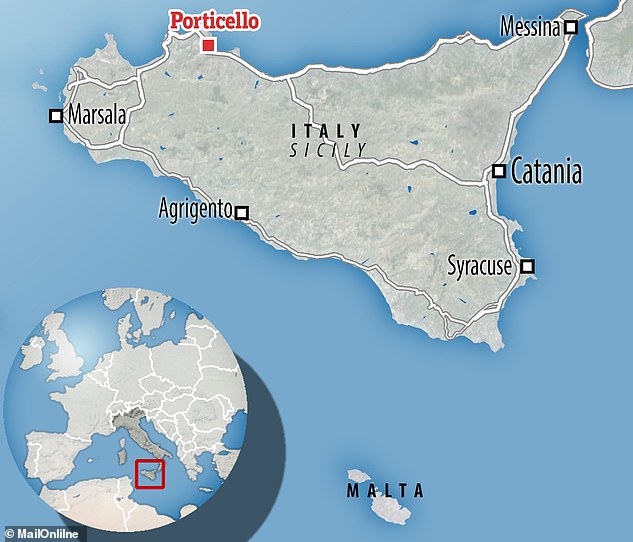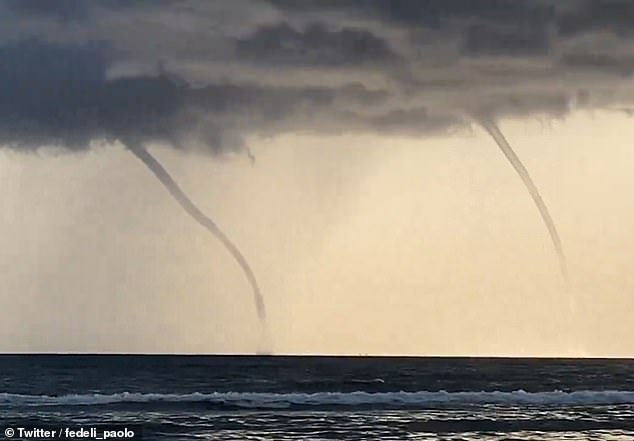Is THIS the reason the Bayesian sank? Climate change amplified the storm that sank Mike Lynch’s superyacht, scientists say – and a wave of similar ‘black swan’ disasters could follow
Efforts are underway to locate the six missing passengers who were on board the Bayesian superyacht when it sank early Monday morning.
British tycoon Mike Lynch and his daughter are among those still missing, two days after the yacht capsized off the coast of Palermo, Sicily, during a heavy storm.
Scientists now claim that climate change amplified the turbulent weather conditions, causing the ship to sink within minutes.
According to experts, this is likely the first of many similar disasters, which is worrying.
They warn that a wave of ‘black swans’ could follow as global temperatures continue to rise.
The luxury sailing ship Bayesian (pictured) sank with 22 people on board on the morning of August 19 off the coast of Porticello, near Palermo, Italy

British tycoon Mike Lynch and his daughter are among those still missing, two days after the ship capsized off the coast of Palermo, Sicily during a heavy storm
According to Italian climatologist Luca Mercalli, the sea surface temperature around Sicily was around 30°C (86°F) when the superyacht sank, almost 3°C higher than normal.
“This creates a huge source of energy that contributes to these storms,” Mercalli said.
‘So we can’t say that this is all due to climate change, but we can say that it has an amplifying effect.’
According to experts and eyewitnesses, the ship was hit by a waterspout – a swirling column of air and water mist.
Strong waterspouts are known to pose a serious hazard to ships and aircraft, due to the energy of the swirling 60 mph (96 km/h) winds they carry – much like a tornado on land.
But Mercalli, president of the Italian Meteorological Society, said it could also have been a downburst, a more common phenomenon in which the air does not rotate.
“We don’t know what it was because it all happened in the dark, in the early morning hours. That’s why we don’t have any pictures,” he said.
In Italy, waterspouts can cause wind gusts of up to 200 km per hour, while downpours can cause wind gusts of up to 150 km per hour.

Authorities and experts have said the ship was hit by a waterspout – a swirling column of air and water mist. Pictured, waterspouts in Fregenae, Italy on the same day as Bayesian yacht disaster
Statistics show that rain showers are becoming more frequent across the country. According to Mercalli, this could be due to global warming.
After weeks of scorching heat, storms and heavy rainfall have ravaged Italy in recent days.
“Climate-related disasters in Italy will become more frequent and more intense,” Mercalli said.
Dr Peter Inness, a meteorologist at the University of Reading, said he agreed with Mercalli that climate change is increasing the likelihood of storms.
‘A major cause of thunderstorms causing waterspouts and downpours is the warm temperature of the sea. Research has shown that waterspouts are more likely to occur when the water is very warm,’ Dr Inness told MailOnline.
‘Part of the Mediterranean is about 3 degrees warmer than normal for this time of year. Some of that warming is due to climate change.
‘But some of the warming is due to natural variation from year to year. Last year, for example, was colder.
Simply put, sea surface temperature is the main source of energy for thunderstorms in the Mediterranean.
“As the ocean warms, the storms have more energy to work with, making their effects—heavy rain, lightning, strong winds—more intense.”
Professor Douglas Parker, a meteorologist at the University of Leeds, said the humidity and warm air from climate change was feeding energy into storms “and making them more intense”.

The Bayesian is classified as a ‘pleasure craft’ due to its length, very tall aluminum mast and 37 feet at its widest point
‘The Mediterranean has warmed faster than other seas and oceans in the world in recent years,’ he told MailOnline.
‘This is therefore fully consistent with the proposition that global warming has increased the likelihood of this event occurring.’
MailOnline contacted the Met Office about the link between waterspouts and climate change, but a spokesperson said they did not wish to comment.
The latest assessment from the Intergovernmental Panel on Climate Change (IPCC) shows that there is little certainty that tornadoes (over land) and waterspouts (over water) are increasing in response to climate change.
However, more recent research may show a link.

